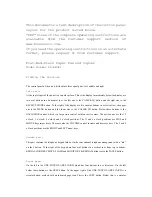
86
UTILITY STITCHES
— — — — — — — — — — — — — — — — — — — — — — — — — — — — — — — — — — — — — — — — — — —
e
Lower the presser foot lever, and then start
sewing.
• For details, refer to “Starting to sew” (page
53).
• For details on sewing reverse/reinforcement
stitches, refer to “Securing the stitching”
(page 55).
f
When sewing is finished, cut the thread.
• For details, refer to “Cutting the thread” (page
56).
■
Changing the needle position
The needle position used as the baseline is
different for the straight stitch (left needle
position) and the straight stitch (center needle
position).
a
Straight stitch (left needle position)
b
Straight stitch (center needle position)
When the stitch width of the straight stitch (left
needle position) is set to its standard setting
(0.0 mm), the distance from the needle position to
the right side of the presser foot is 12 mm
(1/2 inch). If the stitch width is changed (between
0 and 7.0 mm (1/4 inch)), the needle position will
also change. By changing the stitch width and
sewing with the right side of the presser foot
aligned with the edge of the fabric, a seam
allowance can be sewn with a fixed width.
a
Stitch width setting
b
Distance from the needle position to the right side
of the presser foot
c
12.0 mm (1/2 inch)
d
10.0 mm (3/8 inch)
e
6.5 mm (1/4 inch)
f
5.0 mm (3/16 inch)
• For details, refer to “Adjusting the stitch
width” (page 58).
1
2
0.0
2.0
5.5
7.0
3
4
5
6
1
2
Summary of Contents for NV1250D
Page 2: ... ...
Page 6: ...4 ...
Page 50: ...GETTING READY 48 ...
Page 212: ...XE6389 1011 English 885 U01 Printed in China ...
















































